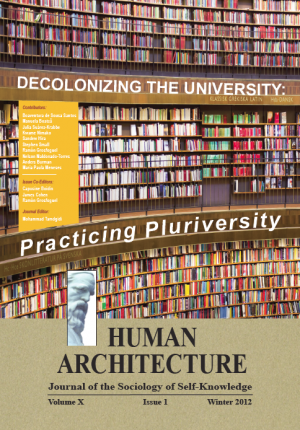Journal Article — Inescapable Past — by Marie Nelson
$15.00
“Inescapable Past” is a literary analysis of Kiran Desai’s, The Inheritance of Loss. Desai’s complex novel revolves around ideas of race, ethnicity, and cultural identity; focusing mainly on Indian culture and how it has both integrated with and influenced Western culture. So often the collision of any different societies is violent and filled with fear and resentment.
Description
Abstract
“Inescapable Past” is a literary analysis of Kiran Desai’s, The Inheritance of Loss. Desai’s complex novel revolves around ideas of race, ethnicity, and cultural identity; focusing mainly on Indian culture and how it has both integrated with and influenced Western culture. So often the collision of any different societies is violent and filled with fear and resentment. In the novel, we see that it is rare that two separate cultures can always coincide peacefully, without one ever trying to dominate the other. The novel is filled with examples of racism and hatred that tears at your heartstrings. It is clearly shown through each of Desai’s characters that individuals are usually a carbon copy of their environment, history, and family, even though this is often unconscious. The past that people carry with them is one of the main reasons old prejudices are so resilient. Desai investigates these truths in her novel by looking into the lives of these few interconnected characters. When each of the characters in the novel encounters a foreign culture, their experiences vary, but are mainly negative, which is sadly quite realistic. Every experience shows again that the past or cultural identity an individual carries with them will always influence their view of others. However, the novel also shows by the end, that it is possible to change or bend an identity into one with respect and appreciation for all people. As the world continues to integrate and the boundaries of countries and cultures disappear through globalization, it is becoming more and more unacceptable and politically incorrect to separate people based on race, wealth, origin, religion, gender, language or any other distinguishing human trait. This is not to say that cultures should blend so completely that different languages and traditions become obsolete or wrong, but cultures should simply recognize that different does not automatically mean unequal. Desai’s novel holds a mirror up to the world today; looking at a few specific cultural collisions to show that racism is unfortunately alive and well, but that it is also not a death sentence.
Recommended Citation
Marie Nelson. 2008. “Inescapable Past.” Pp. 67-72 in Microcosms of Hope: Celebrating Student Scholars (Human Architecture: Journal of the Sociology of Self-Knowledge: Volume VI, Issue 4, 2008.) Belmont, MA: Okcir Press (an imprint of Ahead Publishing House).
The various editions of Microcosms of Hope: Celebrating Student Scholars can be ordered from the Okcir Store and are also available for ordering from all major online bookstores worldwide (such as Amazon, Barnes&Noble, and others).
Read the Above Publication Online
To read the above publication online, you need to be logged in as an OKCIR Library member with a valid access. In that case just click on the large PDF icon below to access the publication. Make sure you refresh your browser page after logging in.








